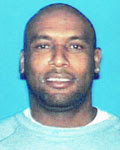Juan Carlos Ramirez Abadia, who had been imprisoned for money laundering in Brazil, was handed over to U.S. agents in the Amazonian city of Manaus
 Ramirez Abadia, known as "El Chupeta" (Lollipop) and long considered one of the world's major traffickers, is under U.S. indictment on racketeering, money laundering and murder charges. In one case, he is accused of ordering a hit team to kill a trafficker employed by his organization in Queens, N.Y.
Ramirez Abadia, known as "El Chupeta" (Lollipop) and long considered one of the world's major traffickers, is under U.S. indictment on racketeering, money laundering and murder charges. In one case, he is accused of ordering a hit team to kill a trafficker employed by his organization in Queens, N.Y.Juan Carlos Ramirez Abadia, who had been imprisoned for money laundering in Brazil, was handed over to U.S. agents in the Amazonian city of Manaus and flown to New York, the Brazilian Justice Ministry said.Acting Drug Enforcement Administrator Michele M. Leonhart, in a statement issued Friday in Washington, labeled Ramirez Abadia "one of the most violent and prolific narcotics traffickers in the hemisphere."The Justice Ministry here said that U.S. officials agreed to limit Ramirez Abadia's maximum prison time, if he is convicted, to 30 years, the most he would have faced in Brazil.Ramirez Abadia is a rare Latin American reputed drug lord who willingly sought extradition to the United States. Once in Brazilian custody, he even offered to hand over tens of millions of dollars in hidden proceeds to Brazil in exchange for speedy extradition.Ramirez Abadia allegedly was among the ringleaders of Colombia's Norte del Valle cartel, which became the country's most powerful drug gang during the 1990s.The sophisticated cartel is accused of organizing the transport of more than 500 tons of cocaine worth more than $10 billion from Colombia to the United States, the U.S. Justice Department said.Ramirez Abadia "controlled a large percentage of those drug exports" and employed "hundreds" in his enterprise, including dozens of killers, the Justice Department said.
The gang killed rivals, bribed police and laundered profits, the Justice Department charged. Ramirez Abadia fled to Brazil after serving a prison term in Colombia. He was arrested again in August 2007 at a luxurious condominium outside Sao Paulo, South America's most populous city.Because of Ramirez Abadia's plastic surgery, authorities reportedly used voice-recognition technology to confirm his identity from wire-tapped phone calls. At the time, U.S. officials were offering a reward of up to $5 million for information leading to his capture.His enthusiasm for extradition prompted speculation that Ramirez Abadia was keen to provide information to U.S. authorities in exchange for a reduced sentence. But he denied in a television interview here that he would testify against former confederates.
"I'm not going to make any deals," he told TV Globo in a jailhouse interview last year. "I'll assume responsibility for my problems alone."
The drug-trafficking trade would continue to thrive, he predicted, despite his latest arrest and the jailing of other bosses. "I'm in prison, but there are people replacing me, then there will be others," Ramirez Abadia told TV Globo. "It will never end."Since Ramirez Abadia's arrest a year ago, Brazilian authorities have auctioned off many of his holdings, including at least four homes. Assets and cash totaling more than $700 million have been seized from his organization, according to the Justice Department.

Comments
Post a Comment